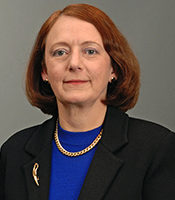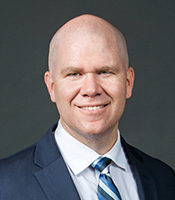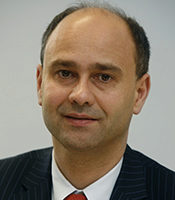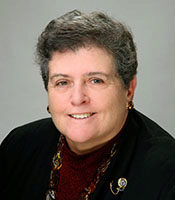About
The Pension Research Council of The Wharton School of the University of Pennsylvania is committed to generating debate on key policy issues affecting pensions and other employee benefits. We sponsor interdisciplinary research on the entire range of private pension and social security programs, as well as related benefit plans in the United States and around the world.
PRC Director

Olivia S. Mitchell is the International Foundation of Employee Benefit Plans Professor of Insurance/Risk Management and Business Economics/Public Policy at the Wharton School of the University of Pennsylvania. Her research focuses on private and public insurance, risk management, public finance, labor markets, compensation, and pensions with both a U.S. and an international focus. She also is the Executive Director of the Pension Research Council and the Director of the Boettner Center on Pensions and Retirement Research at Wharton, a Faculty Research Fellow at the National Bureau of Economic Research, and an Associate Director of the Financial Literacy Center. She received her B.A. in Economics from Harvard University, and her M.S. and Ph.D. degrees in Economics from the University of Wisconsin-Madison.
Advisory Board

Julie R. Agnew is the Director of the Boehly Center for Excellence in Finance at the Mason School of Business of the College of William and Mary. Her research and consulting activities focus on behavioral finance and its relationship to financial decisions made by individuals in their retirement plans. She received her B.A. in Economics from the College of William and Mary, and her Ph.D. degree in Finance from Boston College.

Gary W. Anderson is an independent consultant, and he serves as Chair of the Board of Pensions and Health Benefits for the Rio Texas Conference of the United Methodist Church. Previously he served as Executive Director the Texas Municipal Retirement System. He received a BA in Political Science from Texas A&M University and an MA in Public Management from the University of Houston at Clear Lake City.

David S. Blitzstein established Blitzstein Consultancy where he provides professional trustee services and strategic advice to labor unions and employee benefit trust funds. Previously he served as a collective bargaining expert on pension and health insurance for the United Food and Commercial Workers (UFCW) and the United Mine Workers of America, and he was the UFCW’s Special Assistant for Multiemployer Plans. He is a Governor-appointed trustee of the Maryland State Retirement System and a Presidential appointee to the PBGC Advisory Committee. He received his BA in History from the University of Pennsylvania and the MS from the University of Massachusetts in Amherst.

Robert L. Clark, is the Stephen Zelnak Professor of Economics and Professor of Management, Innovation and Entrepreneurship in the Poole College of Management, North Carolina State University, and Research Associate at the National Bureau of Economic Research. His research examines retirement decisions, the choice between defined benefit and defined contribution plans, the impact of pension conversions to defined contribution and cash balance plans, the role of information and communications on 401(k) contributions, and government regulation of pensions. He has written widely on state and local pension plans and retiree health plans for public sector employees.

Peter Conti-Brown is an assistant professor at The Wharton School of the University of Pennsylvania. A financial historian and a legal scholar, Conti-Brown studies central banking, financial regulation, and public finance, with a particular focus on the history and policies of the US Federal Reserve System. His current research focuses on the history of bank supervision in the United States from the Civil War to Donald Trump, as well as the political and institutional history of the US Federal Reserve. He received his law degree from Stanford Law School and his PhD in history from Princeton.

Julia Coronado is President and Founder of Macro Policy Perspectives. Previously, she was Chief Economist for Graham Capital Management, L.P.; and Chief Economist, North America for BNP Paribas and Senior U.S. Economist at Barclays Capital. She also served as an Economist for the Federal Reserve Board of Governors in Washington D.C. Her research focuses on understanding interactions between financial markets and the real economy, forecasting the US economy, and monetary and fiscal policy. She is a member of the Economic Advisory Panel of the Federal Reserve Bank of New York. She earned the PhD in economics from the University of Texas at Austin.

Peter A. Fisher is the founder of Cortus Advisors, a strategic advisory firm focused on helping organizations pursue new sources of growth in revenue, profitability, and entity value through new business development, business model design, market entry strategies, product/service development, customer selection, and pricing strategy. Previously Peter was a partner at Tapestry Networks where he led the firm’s practice in financial services, spanning insurance, banking, asset management, and private equity on issues of governance, industry transformation, business development, and public policy engagement. His general interests are financial services, strategic new business development, new product development, and thought leadership. Previously he was managing director at Pyramis Global Advisors, the institutional asset management unit of Fidelity Investments, where he focused on long-term business strategy and global expansion initiatives; he also led the design and launch of the Fidelity Research Institute and led the Strategic New Business Development group. Previously he was affiliated with Bain & Company and National Economic Research Associates (NERA). He earned a BA in economics at Northwestern University, and his MA and PhD in business economics at Harvard.

P. Brett Hammond is Research Leader of the Client Analytics Group at the Capital Group. His research interests include finance, higher education, and public policy. Previously, he served as Managing Director and Head of Multi-Asset Class Applied Research at MSCI, Chief Investment Strategist at TIAA-CREF, and on the staff of The National Academies, and he was a member of the UCLA faculty. He received BA degrees in Economics and Political Science from the University of California at Santa Cruz and the Ph.D. from MIT. He is also Program Chair and Executive VP of the Institute for Research in Quantitative Finance (Q Group).

J. Mark Iwry is a Nonresident Senior Fellow at The Brookings Institution, a Nonresident Visiting Scholar at The Wharton School, and an advisor to academic, policy, nonprofit, and for-profit enterprises. Previously he served as Senior Advisor to the U.S. Secretary of the Treasury and, concurrently, as the Treasury Department’s Deputy Assistant Secretary for Retirement and Health Policy. Prior to that he was a partner in the law firm of Covington & Burling, Of Counsel to the law firm of Sullivan & Cromwell, the Treasury Department’s Benefits Tax Counsel, Research Professor at Georgetown University, and co-founder and Principal of the nonpartisan Retirement Security Project. A principal architect of the Saver’s Credit to expand 401(k) and IRA coverage of middle- and lower-income workers, the “myRA”, and the “SIMPLE” IRA plan, he also co-authored President Obama’s legislative “auto IRA” proposal to achieve enhance automatic enrollment in IRAs. He graduated with honors from Harvard College and Harvard Law School, and he earned a Masters in Public Policy from Harvard’s Kennedy School.

Emily Kessler is a Senior Fellow of the Society of Actuaries (SOA), where she has worked with the Retirement 20/20 initiative to envision 21st century retirement systems. Her interests include research and education issues for pension actuaries, and on the implications of financial economics on the pension actuarial paradigm and in understanding post-retirement risks. She received a BA in mathematical methods in the social sciences with an emphasis in sociology from Northwestern University.

Surya Kolluri is on the Operating Committee of the Bank of America Merrill Lynch Retirement and Wealth Solutions Business where he leads thought leadership efforts. He oversees incubation and commercialization of research and programs on Social Impact Investing, Longevity, and Retirement. His previous roles at Bank of America include Head of Strategy, Business Support Executive, and Channel Development Manager. Before that, he worked at Bain & Company and A.T. Kearney as a strategy management consultant. He currently serves on the board of the MA/NH chapter of the US Alzheimer’s association, the CEO Initiative for Alzheimer’s (CEOI), and the Global Coalition on Aging (GCOA). He earned an MBA from the Wharton School of the University of Pennsylvania and an MS from Drexel University.

David Laibson is the Robert I. Goldman Professor of Economics at Harvard University, where he leads Harvard University’s Foundations of Human Behavior Initiative. His research focuses on the topic of behavioral economics. He serves on several editorial boards, as well as the board of the Health and Retirement Study (National Institutes of Health) and Harvard’s Pension Investment Committee. He is also serves on the Academic Research Council of the Consumer Financial Protection Bureau. He is also a member of the National Bureau of Economic Research. His is a Fellow of the Econometric Society and the American Academy of Arts and Sciences, and he was a recipient of the TIAA-CREF Paul A. Samuelson Award for Outstanding Scholarly Writing on Lifelong Financial Security. He earned his AB from Harvard University, his MsC from the London School of Economics, and the PhD from the Massachusetts Institute of Technology.

Robin F. Lenna is a senior executive in financial services with expertise in structured risk products, retirement solutions, investments, and risk management. Robin was Chairman, President & CEO of General American Life Insurance Company and Metropolitan Tower Life Insurance Company. Her responsibilities included a broad range of structured risk and funding solutions for institutional retirement plans, including pension de-risking, annuity and investment products for defined contribution plans, corporate and bank-owned life insurance, and funding for post-retirement benefits. Previously she served as MetLife’s chief risk officer and head of structured credit at FleetBoston, and she also worked on credit derivatives, structured credit, and insurance techniques at Citigroup. She earned her B.A. from Swarthmore College and the M.B.A. from Temple University.

Annamaria Lusardi is the Denit Trust Distinguished Scholar and Chair Professor of Economics and Accountancy at The George Washington University School of Business where she heads the GW Global Financial Literacy Excellence Center. Her research interests focus on financial literacy, household debt and decision-making, and personal finance. Previously, she taught at Dartmouth College, Princeton University, the University of Chicago Harris School of Public Policy, the University of Chicago Booth School of Business, Columbia Business School, and the Harvard Business School. Dr. Lusardi was awarded the Forbes Public Awareness Award from the Council for Economic Education, the Odom Visionary Leadership Award from the Jump$tart Coalition for Personal Financial Literacy, the National Numeracy Network’s Steen Award, and the Fidelity Pyramid Prize. She earned her BA in Economics from Bocconi University, and her Ph.D. in Economics from Princeton University.

Jeannine Markoe Raymond is Director of federal relations for the National Association of State Retirement Administrators where she advocates the interests of NASRA members before Congress and the Administration. She also is a liaison to other professional associations, interest groups, and policy organizations. She coordinates numerous policy and federal education efforts between NASRA and other national associations regarding state and local retirement issues. Previously she was a legislative analyst for the Government Finance Officers Association, and she also worked for the California Debt Advisory Commission within the California State Treasurer’s Office. She received a BA in economics from the University of California, San Diego, and the MS with honors in public administration and intergovernmental management from the University of Southern California.

Raimond Maurer is the Chair of Investment, Portfolio Management, and Pension Finance at the Finance Department of the Goethe University Frankfurt. His research focuses on asset management, life-time portfolio choice, real estate, and pension finance. Previously he visited the Wharton School, and he serves in several professional capacities including the Union Real Estate Investment group, the Society of Actuaries (academic chairman of AFIR), the Association of Certified International Investment Analysts (academic director and member of the International Examination Committee). He earned his habilitation, dissertation, and diploma in business administration from Mannheim University and he was awarded an honorary doctorate from the State University of Finance and Economics of St. Petersburg. He also serves on the Senate of the Goethe University.

Alicia H. Munnell, is the Peter F. Drucker Professor of Management Sciences at Boston College’s Carroll School of Management and the director of the Center for Retirement Research. Her research interests include tax policy, Social Security, public and private pensions, and productivity. Previously she served as a Member of the President’s Council of Economic Advisers and Assistant Secretary of the Treasury for Economic Policy; she also was Director of Research at the Federal Reserve Bank of Boston. She co-founded and was the first President of the National Academy of Social Insurance, and she is a member of the American Academy of Arts and Sciences and the Institute of Medicine. She is also a member of the Board of The Century Foundation, the National Bureau of Economic Research, and the Pension Rights Center. She earned her B.A. from Wellesley College, the M.A. from Boston University, and the Ph.D. from Harvard University.

Michael Orszag is Global Head of Research at TowersWatson, a global actuarial consulting firm. His research interests include pensions, personnel economics, risk management, and insurance. He is a founding editor of the Journal of Pension Economics and Finance and co-editor of the Oxford Handbook of Pensions and Retirement Income. He earned his PhD from the University of Michigan in economics and the AB from Princeton University in economics.

Anna M. Rappaport is an actuary, consultant, author, and speaker on the impact of change on retirement systems and workforce issues. Her interests include ways to improve retirement security and opportunities for older Americans, including women’s security, disability and defined contribution plans, phased retirement, and improving planning capacity. Previously she served at Mercer, and she is a past-President of the Society of Actuaries and chairs its Committee on Post-Retirement Needs and Risks. She is a Fellow of the Society of Actuaries and a member of the American Academy of Actuaries. She earned the MBA from the University of Chicago Booth School of Business.

David P. Richardson is a Senior Economist at the TIAA Institute. Previously he held the New York Life Chair in Risk Management and Insurance at Georgia State University and served as Senior Economist for Public Finance at the White House Council of Economic Advisers. He also worked as a Financial Economist in the Office of Tax Policy at the U.S. Treasury, and he taught economics at Davidson College. He earned the MA and PhD in economics from Boston College, and a BBA from the University of Georgia.

John Sabelhaus is the Assistant Director in the Division of Research and Statistics at the Board of Governors of the Federal Reserve System and a lecturer in the Department of Economics at the University of Maryland. At the Federal Reserve Board he oversees the Microeconomic Surveys and Household and Business Spending sections, where he had primary responsibility for the Survey of Consumer Finances. Previously he was a Senior Economist at the Investment Company Institute; he also served as Chief of Long Term Modeling at the Congressional Budget Office, where he oversaw the development of an integrated micro/macro model of Social Security and Medicare. John received his PhD in economics from the University of Maryland.

Richard C. Shea is chair of Covington & Burling LLP‘s Employee Benefits and Executive Compensation practice, where he focuses on cash balance, pension equity, and other complex benefit plan designs. Previously, he served as Associate Benefits Tax Counsel at the Treasury Department, where, together with his colleagues at the Treasury Department and the Internal Revenue Service, he was responsible for developing federal tax legislation and regulations governing employee benefits and executive compensation. He received his AB from Amherst College and the JD from the University of Virginia School of Law.

Kent Smetters is a Professor of Insurance/Risk Management and Business Economics/Policy at the University of Pennsylvania’s Wharton School, and he holds the Joseph E. and Ruth E. Boettner Chair of Financial Gerontology. His interests include government debt, Social Security policy, insurance, financial planning, along with the relationship between the elderly’s well-being and their social, legal, psychological, physical, and environmental well-being.. He has visited Stanford University and served at the US Treasury, and he is Research Associate at the NBER. He earned his BA degrees in Economics and Computer Science from the Ohio State University, and the Masters and PhD degrees in Economics from Harvard University.

Stephen P. Utkus is principal and director of the Vanguard Center for Retirement Research; he is also a member of the senior leadership team of Vanguard’s institutional retirement business in the U.S. The Center conducts and sponsors research on retirement savings in the United States. Mr. Utkus is also a Visiting Scholar at The Wharton School of the University of Pennsylvania, and he is a member of the Board of Trustees of the Employee Benefit Research Institute. He earned the MBA from the Wharton School.

Jack L. VanDerhei is the Research Director of the Employee Benefit Research Institute (EBRI) where he directs the EBRI Defined Contribution and Participant Behavior Research Program, the EBRI Retirement Security Research Program, and the EBRI Center for Research on Retirement Income. He received his BBA and MBA from the University of Wisconsin-Madison and his MA and PhD from the Wharton School of the University of Pennsylvania.

Stephen P. Zeldes, is the Benjamin M. Rosen Professor of Economics and Finance at Columbia University’s Graduate School of Business, and currently serves as chair of the school’s Finance and Economics division. His research areas include both macroeconomics and household finance, including topics such as saving behavior, social security reform, pension policy, retirement account portfolio choices, annuitization and retirement security, the effects of government budget deficits, and the relationship between consumer spending and the stock market. He teaches courses on macroeconomics and on consumer finance. He is co-director of the Working Group on Household Finance at the National Bureau of Economic Research. Zeldes received a BS from Brown University and a PhD from the Massachusetts Institute of Technology.


